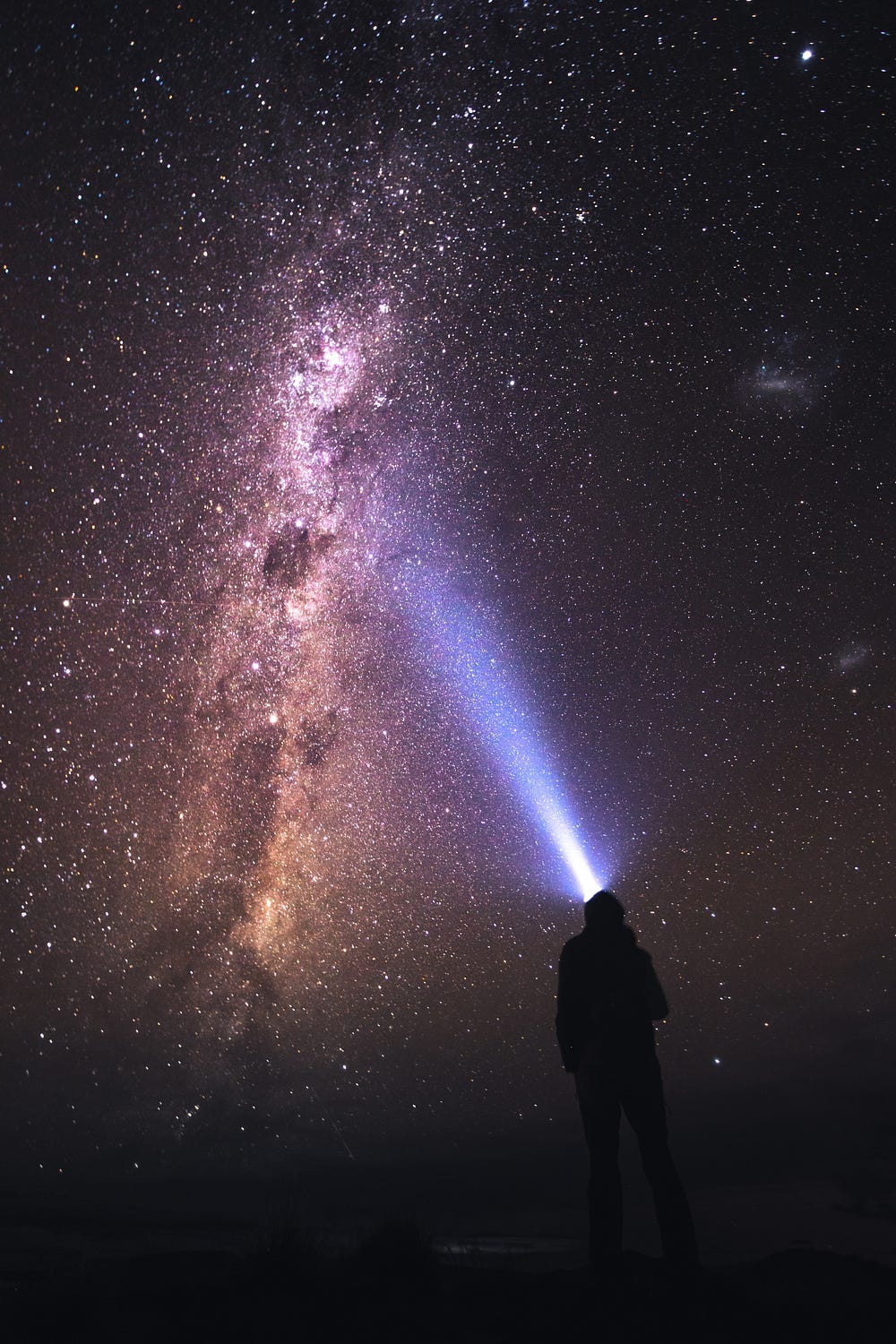
“On a conservative estimate, the Earth might be able to sustain around ten quadrillion people in total before it becomes uninhabitable (that’s ten plus fifteen zeros!). And if humanity successfully spreads across the Milky Way, then this number may grow by many orders of magnitude.”
That sure sounds like a lot of people yet to be born! We must indeed be careful not to drive ourselves extinct, lest we prevent an untold number of human lives from flourishing in this beautiful Universe… There is a wee little problem with this idea though: it’s all based on a fantasy far divorced from reality.
A recent article on the fine blog Economics From the Top Down has brought ‘longtermism’ back into the center of my attention. Longtermism is a philosophical movement holding the ethical view that we should prioritize the far future of humanity — our species long term survival — over its short term needs and desires. And when they say “far future” they mean it: several hundred-thousands of years into the great unknown — hence the astronomical figures quoted above. We rarely think that far ahead though. For most of us, humans, thinking about the future rarely extends beyond what’s going to be for dinner. (And while this might sound somewhat short sighted, for billions of people this is a truly existential question.)
So how much is that several hundred-thousand years? Let’s put that into its proper context first. Imagine the history of life on this planet published as a book series, with a single page dedicated to a thousand years of natural history in each book. With a thousand pages in a volume, each telling the story of a million years, we would still need to find shelf space for some 4200 books… Enough to fill a small library. Now close your eyes and imagine that you are standing right in front of a set of massive bookshelves hosting the entire living history of planet Earth at an arm’s reach, or perhaps a few steps away.

The first half of our collection would speak only about a soup of organic matter with some ancient bacteria (archea) appearing somewhere around volume 500. The first Eukaryote (a cell with a nucleus, a basic building block of all complex life) would make its first appearance in volume 2100, from where the complexity of life would explode. OK, ‘explosion’ might be too harsh of a term here, unless you refer to the ache in your arms: you would literally have to sift through thousands (!) of 1000-page tomes till you would find the first animal somewhere in (or around) volume 3600 — some 600 million years ago. Yes, 3600 volumes out of a library of 4200 freaking tomes, each covering a million years of natural history, and not a single worm!
Dinosaurs made their debut in volume 3955 from where these massive animals did managed to dominate the book series for 185 volumes, quite a feat. After reading 60 more books about the rise of mammals and the incredible ancient megafauna, things start to get interesting. Without going too much into the details of human origins, the earliest fossils clearly in the human (and no longer in the chimpanzee lineage) appear between about 4.5 to 4 million years ago, or in volume 4195. Congratulations! After lifting and flipping through almost the entire library, you have found the first proto-human!
If you thought that our species were that old, though, I have to disappoint you. If you were looking for Homo sapiens, a specimen of which is typing this essay for you, you would only had to pick the very last volume of this vast library of 4200 books. Yes, only the very last one. In this book, somewhere between page 250 and 350 (or 750,000 and 550,000 years ago, you would find the first Neanderthal, and somewhere around page 700 the first traces of the earliest modern humans.
…fragments of 300,000-year-old skulls, jaws, teeth and other fossils found at Jebel Irhoud, a rich site also home to advanced stone tools, are the oldest Homo sapiens remains yet found.
The remains of five individuals at Jebel Irhoud exhibit traits of a face that looks compellingly modern, mixed with other traits like an elongated brain case reminiscent of more archaic humans.
Here is your longtermism: 300 pages of modern human history in a library of 4.2 million pages. Puff. Since it took so much time to get here, my fellow Homo sapiens sapiens, read these pages carefully. This is your species history! Picture yourself standing in this wast library of life, holding only one book in your hands, and reading the last 300 pages of it. Try to feel important, if you wish, but I would not bet the farm on it that you actually do at the moment.
You look down on the text, and read about small tribes or communities if you like, wandering among millions of other species in a vast wilderness, feeling every bit as part of Nature as any other fellow animal. No concrete, no steel and no glass. No cars, no pollution, no noise. No planes flying over your head, no machine guns, no nuclear weapons. Just us, and Nature.
Page after page, a story unfolds in front of your eyes: how our species traversed the face of this planet, how they reached even the furthest bit of land imaginable. How they lived and died without wanting to grow the economy, control Nature, extract minerals and destroy entire ecosystems. Truth to be told, they were far from being innocent though: they drove many large mammals and birds into extinction, burned down entire forests and spread species where they don’t belong. They have clearly left their marks on the face of this globe, but never placed themselves into the center of creation.
Then, after reading hundreds of pages you reach the last 10 pages of volume 4200. The first cities appear, agriculture starts here and there — but this is far from being a revolution yet. It has all begun as play farming, a side activity to hunting and foraging with ebbs and flows in its prominence. Then you read about Çatalhöyük (c. 7,500 BCE — 5,700 BCE) on page 992–994, with the civilizations of Mesopotamia, Egypt, ancient China, and Peru making their appearances in due order.
Civilizations came and went until finally, in the last paragraph, on the bottom third of the very last page of the very last book (out of the 4200 volumes in the library of life), our species finds a way to harness the power of fossil fuels. Its population explodes into the stratosphere as it uses its new found energy source to mine all the minerals it needs — including plant nutrients like phosphorus and potassium — to grow as much food as it can for itself and its livestock. It cuts down all the old-growth forests, builds cities and cover a third of the planet’s habitable surface with farms. Is this sustainable? Can we stabilize here and go on with a stable population of 11 billion for hundreds of thousands of years more?
This is where reality bifurcates from fiction. According to longtermist beliefs we can keep on mining minerals and plant nutrients, needed to feed this many of us for as long as we see fit. They fail to grasp the fact that all of the resources supporting our high population levels, cities, transportation systems, housing and all the rest are finite. In fact we use many times more than we find or gets regenerated every year. We already live well beyond are means. We deplete Earth’s natural resources, biodiversity, mineral reserves, top soils, freshwater and energy resources at an alarming rate… Yes, including the very energy source which gave rise to our power: fossil fuels.
Longtermists also tend to forget the result of all this burning and digging is now circulating in the planet’s atmosphere and waters, turning world oceans into empty dead zones, and melting the polar ice cap which used to reflect much of the Sun’s heat back into space… turning all these negative consequences into a self-reinforcing feedback loop. All this, at the very end of a single paragraph, in a 4,200,000 pages long story. A major blip, but a blip nonetheless.
How we are about to uphold even a drastically reduced version of this inherently unsustainable proposition…? Let’s face it: Earth cannot sustain ten quadrillion people, no matter how we wish. We already live well beyond our home planets carrying capacity: outpacing most other living organisms and setting the sixth mass extinction in motion. There is no chance for any civilization on a dead and overheated planet.

The question of longtermism, namely how do we prevent our extinction via AI, nanobots, or a mishap in the great hadron collider and all the rest, is thus completely moot. Irrelevant. As natural and mineral resources decline and pollution starts to take its toll en masse these questions will suddenly look entirely fictional… Like the idea of colonizing the Galaxy1, or asking something akin to: ‘How many angels can dance on the head of a pin?’
The only question in front of us, is thus how do we wish to leave the center of the scene? The fast and furious way via nukes, followed by a multi-year long nuclear winter causing widespread famine and taking most complex life down with us (something akin to the way of the dinosaurs)? Or gracefully, and perhaps finding a way to become a member of the many species surviving the bottleneck ahead…? I would personally opt for the second option, as it leaves at least a slim chance for us to evolve into another hominid species… One which is better adapted to the radically changed climate and perhaps — only perhaps — blessed with a little more wisdom than what we their unwise ancestors possessed.
Until next time,
B
This — overshooting natural resource limits — is why I find aliens visiting us most unlikely. While I fully accept the possibility of intelligent creatures living on other planets, I find it very unlikely that they got a chance to leave their planet before going extinct or running out of resources. The timespan of our technological society being capable to visit near space before collapsing due to overshoot is infinitesimally short (maybe a 100 years) compared to length of life on Earth (4,200,000,000 years). The chances of finding an intelligent species on a planet capable of traveling in space is thus just 0.000002%. The only question is did any of them have enough time between inventing space travel and running out of resources (or dying of pollution) to solve the many problems of deep space travel?





> One which is better adapted to the radically changed climate and perhaps — only perhaps — blessed with a little more wisdom than what we their unwise ancestors possessed.
A little less greed would go a long way ...
check this out: https://www.amazon.com/dp/B0BZFP2RQT?ref_=pe_3052080_397514860